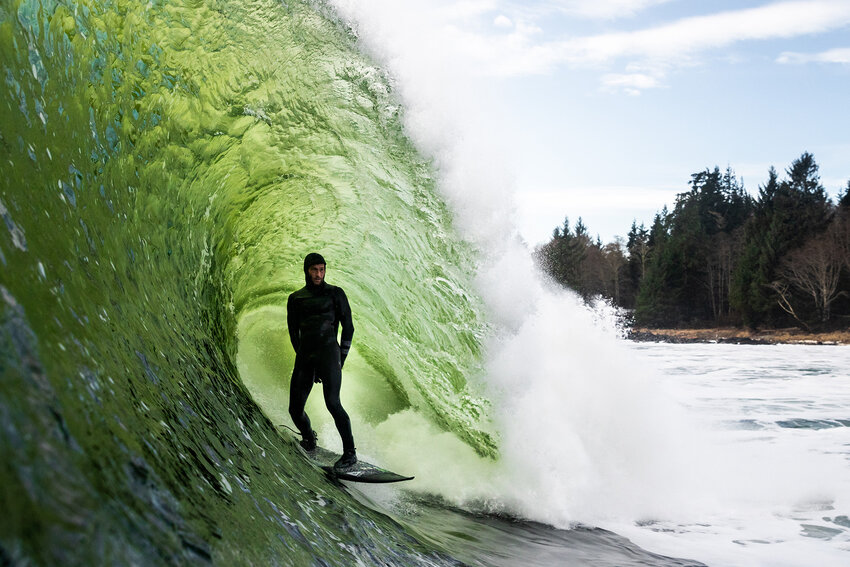 “Pete Devries makes it look too easy, but believe me, it is not,” says Paladino. “I’ll always remember the first time I (successfully) swam at this favorite slab on Vancouver Island. When I got home it felt like I was still in the water.”[/caption]
“Pete Devries makes it look too easy, but believe me, it is not,” says Paladino. “I’ll always remember the first time I (successfully) swam at this favorite slab on Vancouver Island. When I got home it felt like I was still in the water.”[/caption]Tofino-based surf photographer Marcus Paladino has shot for surf magazines in Hawaii, Australia and on both coasts as well as American and Canadian outdoor and lifestyle magazines. He’s also worked with companies like Red Bull, Netflix, Billabong, Arc’teryx and Vans.
Paladino grew up in Nanaimo, B.C., snowboarding at Mt. Washington. His godmother gave him his first camera, a point-and-shoot film camera he used in high school to earn an outstanding achievement award in photography. He moved to Tofino, B.C. when he was 20 and started shooting full time by the age of 25. At 30, he released his first photo book, “Cold Comfort,” in spring 2021.
Mount Baker Experience caught up with him toward the end of his 11th surf season. All photos appear in the book. Questions and answers were edited for length and clarity.
Mount Baker Experience: Had you surfed before you moved to Tofino?
Paladino: I surfed once with some friends, like super briefly. That's the thing, it wasn't like I started surfing and was like, "Oh, this is it!" I actually surfed and thought, "This is kind of hard and lame." As a weird 18-year-old, I was like, "Oh, that was an experience." It wasn't until later that I thought, "Surfing is the source."
When is the surf season in the PNW?
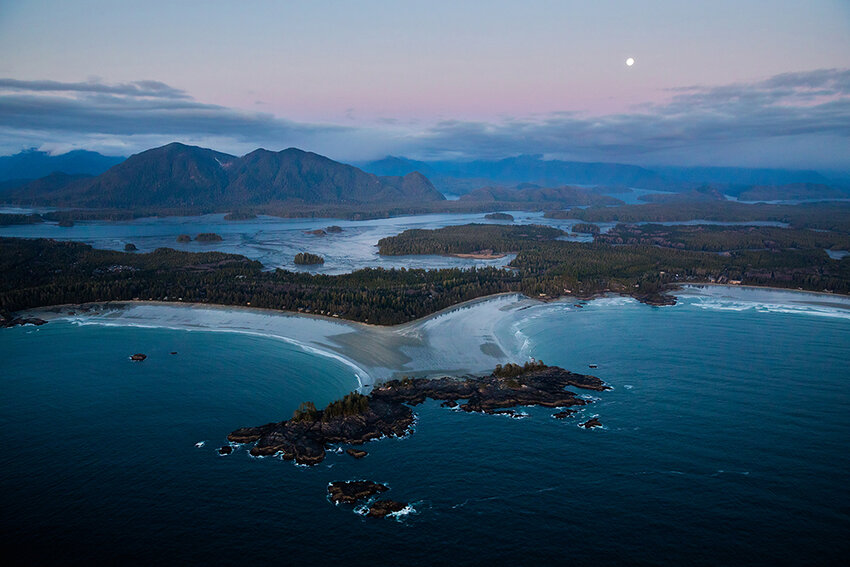 Tofino, B.C., from the air.
Tofino, B.C., from the air.It's 100 percent during the winter. It's funny how surfing ended up being an Olympic sport during the Summer Olympics when everyone in surfing knows surfing is pretty much a winter sport, depending on where you are.
The surf season here is generally best between September and February — those would be the best months. In spring it tapers off, and in summer it's small and onshore. Then once fall comes in it kicks in to gear.
What does a typical season look like for you?
A typical season for me is getting up at the crack of dawn, checking the forecast and seeing where we're surfing that day. I feel like this season has been pretty slow but it ends up being a lot of driving around, looking for waves or hopping on a boat and going up the coast.
It's just been a weird year, or a weird couple of years with Covid.
Typically, I'm trying to be as on it as possible. I try to keep my schedule as clear as possible because there's always last second trips popping up or last second swells emerging. I try to be as flexible and clear as possible, but this winter has been a little slow so I've been taking on more jobs lately.
How much of your schedule is based on the tide?
There's so many different aspects. There's tide, wind, wind direction, swell and swell direction, and intervals between. There's just a lot of factors that go into it, which is why surfing is fun — it really keeps you on your toes.
But generally most spots around here I know everything that needs to line up. It's like a little math equation. The people I shoot too, generally, are really on top of it. So, it's a team effort.
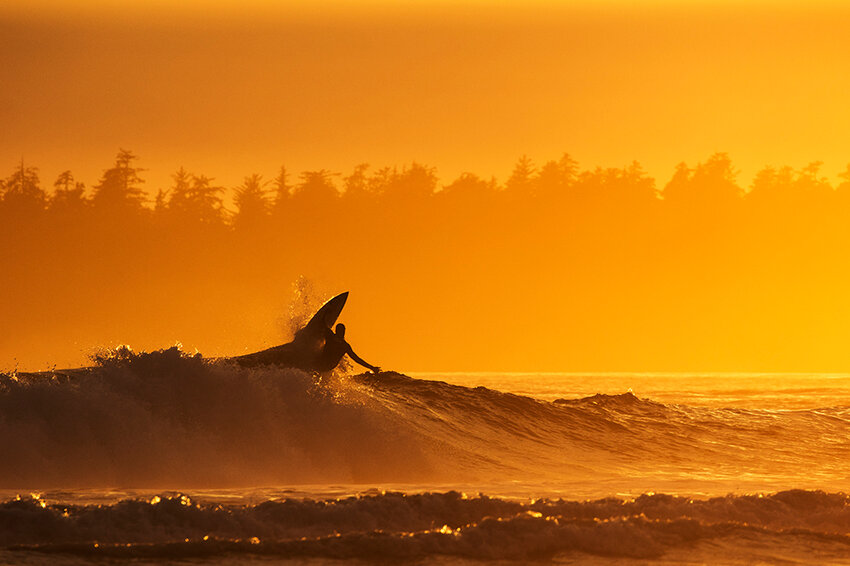 Shannon Brown with a vertical snap at sunset during a rare summertime swell.
Shannon Brown with a vertical snap at sunset during a rare summertime swell.What is your goal when taking a photo?
Ooh, I like that question. I think my goal when taking a photo is to document as creatively as possible. Document creatively and taking advantage of opportunities that might be transient — whether the light’s really good or there's something in the foreground.
I try to spend more time creating than just standing on the beach with a tripod documenting. But when you do that you miss a lot more shots. But I feel like I'm getting better so I'm missing less shots in that sense. I just feel like I've been shooting for so long too that I feel I need to get as creative as I can.
Creativity, that was the one! Anyway, short answer.
You said you're taking a lot of jobs recently, is that commercial work?
A bit of commercial work; also, I've been shooting a lot of vacation rentals recently. I've been keeping busy with that, especially in a tiny tourist town. It's fun shooting something that's completely still, as opposed to what I normally shoot, which is something that's always moving.
Then I have the odd photography/video jobs here and there that are not necessarily surf related. Though, most of my incoming work is surf related.
How has your balance between editorial and commercial work changed over the years?
I feel like I'm putting less emphasis on editorial work. I think at the beginning of my career that was the be-all, end-all for me. I thought, "That was how you become a well-known, action-sports photographer — getting in magazines and publications."
As you know, that industry is still there, but it's hanging on.
I try to put more effort into commercial work and commercial opportunities. I'm trying to organize more photo shoots as opposed to just freelancing as much I've done the last five to six years. Which essentially is just going out, following the swell, shooting surfers and just trying to sell photos after the fact. I still do that all the time, I feel like that's my bread and butter.
Also, I feel like a lot of photographers, not just around here but in general, that are so surf heavy end up totally switching gears and only doing commercial work. Not that that's what I want to do at all, but I feel like that's just a natural progression for people in my industry. They shoot surf so hard that they end up realizing they can make more money shooting other stuff, but they have already developed a style and work ethic from shooting surfing.
You recently released your first photo book, “Cold Comfort.” What’s the story behind that?
I think it's every photographer's dream to come out with a book. I just feel like: Right place, right time, right opportunity. Obviously, putting a book out during a pandemic wasn’t necessary ideal, but, thankfully, people were still buying books online. It sucks that I couldn't do a book signing or release party.
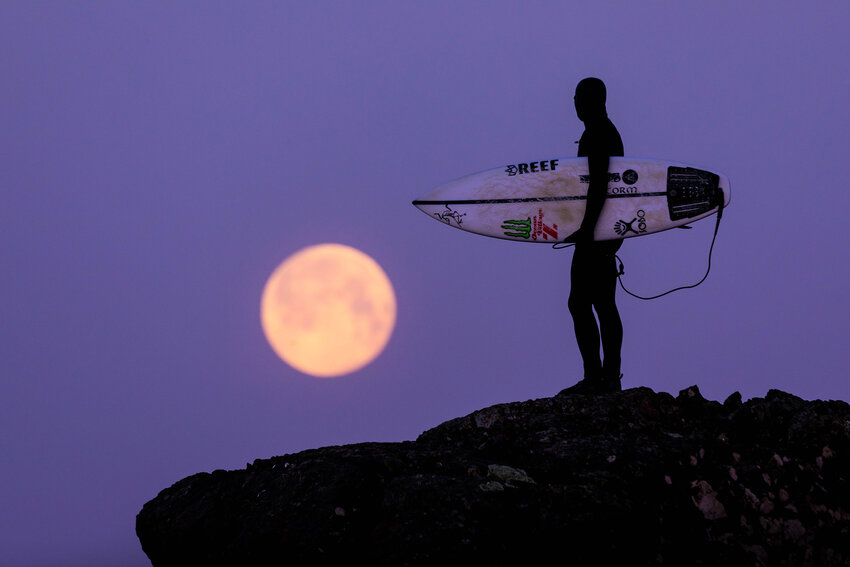 Pete Devries loves early morning surfs, Paladino says. It’s one of the few opportunities to catch a few waves by himself before the sheep flock and start following him around.[/caption]
Pete Devries loves early morning surfs, Paladino says. It’s one of the few opportunities to catch a few waves by himself before the sheep flock and start following him around.[/caption]I'd been shooting here on the coast for 10 years now, and I felt like I had a pretty large body of work and it would be good to share it. I feel like everyone sort of skims over things, with Instagram, my website or even magazines — people just rip through it. When people who have been following me years on Instagram or just in general know my work get the book and are so amazed and immersed like, "Whoa, these photos are amazing!" But you know my work though, this isn't necessarily new content.
There were a lot of unreleased photos in this book, but the majority of it was stuff that you can see on my Instagram or on my website. It was cool to put it altogether into something physical because it just hits different!
And I'm a big fan of photo books.
You say in the book when you first started shooting full time days consisted of “shoot, surf, shoot, edit, emails, sleep.” How have your days changed?
My days are a bit more balanced these days. When I first started trying to be a professional photographer full time, I think I was 24 or 25. I get really obsessed with what I'm doing, and really focused and driven. And I wouldn't really recommend that to everyone, but that's what I had to do. I'm 31 now.
Back then I didn't really think I was a very talented photographer, so I felt I really needed to work hard to become one. Throughout the years, my talent caught up with my hard work. And I thought now I have this skill set to shoot but I'm working so hard that I'm really draining myself.
That's something I've been working on the last couple of years — I'm trying to have a nice balance. Some would say I'm a workaholic. I specifically take one day off every week where there's no email, no editing. I try not to shoot unless it's really good.
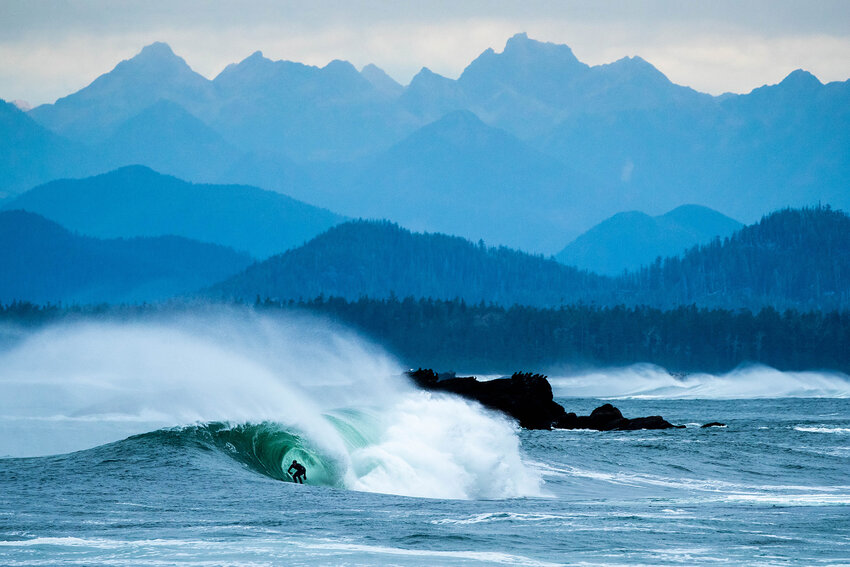 Young Mathea Olin, 17, in the tube.
Young Mathea Olin, 17, in the tube.I think I'm also a lot more particular when I'm shooting too. Whereas back then I would go shoot the beach everyday, all day because I was really honing my skills. Now I'm a bit more selective. I want to make sure the light’s good, the conditions are good, especially if I'm shooting the beaches around. I can't count the amount of times I've shot Cox Bay.
I try to be a little bit more mindful with my time and energy, specifically, my energy, because I've only got so much. I'm not burning the candle at both ends these days.
How did that affect your social life?
My social life? My social life was great. My dating life? My dating life was blah.
I felt like if I was dating girls or seeing girls that it almost felt like a distraction for me. I really wouldn't put my best foot forward or enough of my energy into that because I was so focused on surfing and shooting, and trying to make this a career. I avoided what would've been healthy relationships at that time. I'm pretty introverted myself. I don't mind spending a lot of time by myself.
That comes back to the balance point — you can have it all. You can be in a healthy, loving relationship and still follow your dreams. But, at the time, I thought it was one or the other. Which is not the case, obviously, but being young and naive I thought I knew what was up.
How has social media impacted your career?
I've always tried to not put too much emphasis on social media. Obviously, I have it and I use it, and I announce things that are going on. But I've always had this pretty firm mindset that if Instagram exploded today and there was no Instagram, would I still have a career? And the answer is "yes."
It's also cool that you can be in contact with people all the time. People can slide into your and say, "Hey, I really like your work. You inspired me." It's really cool on my end, because I didn't have that when I was an aspiring photographer looking at other people's work. I couldn't flip through a magazine and immediately message the photographer and say, "This is a great shot! What are your settings?"
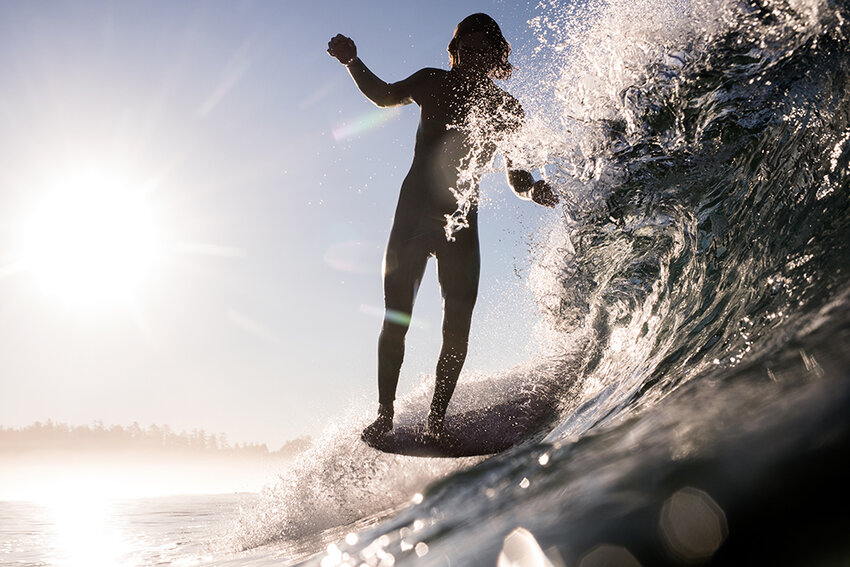 Andy Jones demonstrates a classic hang ten.
Andy Jones demonstrates a classic hang ten.How do you think it’s affected the industry?
I know that a lot of people will hit up brands and offer to trade some photos for some product. And that's a big problem for people in my industry because we're trying to get paid. A lot of times companies will offer me product or gift cards, which is fun but I can't pay my rent in sweaters.
What I've told people is, "I can't eat your product, so I'm good."
At least I was a bit more hard-done by it at the beginning [of my career] because I was just trying to make ends meet to be a photographer full time. Whereas now I'm not as intense about it, but I know that's a big problem in the industry.
Is there anything you say to upcoming photographers?
Don't expect instant gratification. You're going to take a lot of bad photos for a long time and then you're going to take some good photos for even longer. Just keep shooting and work hard. It doesn't happen over night.
If you love what you're doing, you're already winning. For me, specifically, if I wasn't a full-time surf photographer and that wasn't my career, I would still be shooting surfing — like nothing changes. So, if you focus on that and know you enjoy doing it and that's what you have a passion about, whether the money comes or not you're already successful, because a lot of people don't have that.
Have you been injured while shooting?
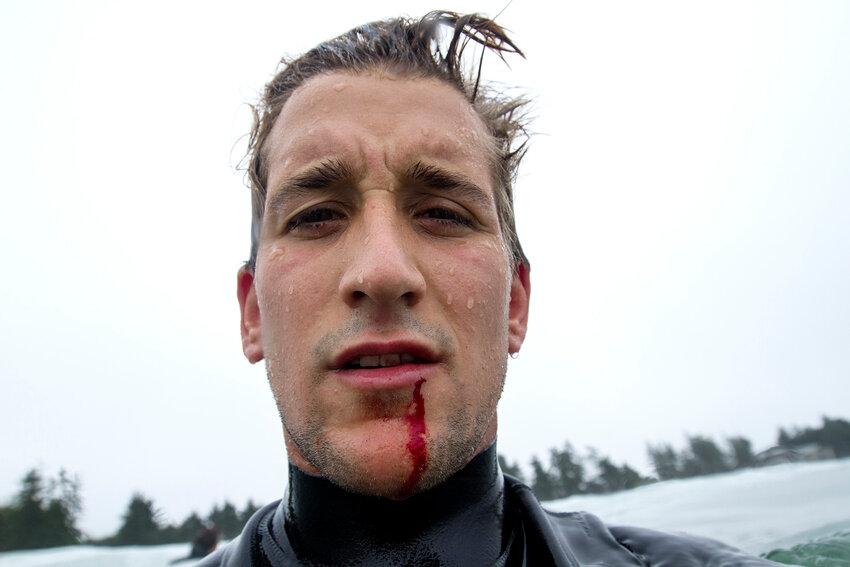 Marcus Paladino after taking a surfboard to the face.
Marcus Paladino after taking a surfboard to the face.Yeah, I took a surfboard in the face and my tooth went through my lip. I still have a little scar there. That was fun.
Otherwise, the only other proper injury I got when shooting wasn’t really even an injury. I got the heaviest, gnarliest, tightest foot cramps I’ve ever had in my life — to the point where I was limping for days after.
Surf spots are sacred locations. Have you ever accidentally revealed a secret spot through your photos and gotten flak for it?
Maybe my first year in Tofino, I don't know if I said the spot name but I definitely sort of described how to get there. And somebody hit me up and said, "I know you're new to this, but that's not cool." I didn't realize because I came from snowboarding, where it's not really a big deal to talk about where you're riding. But ever since then, I keep that pretty close to the chest.
One time a magazine revealed a location, and that kind of bummed me out. They were like, "Marcus Paladino claims that so-and-so wave is here in this place." And I didn't say that, but they knew where it was. So I had to hit them up afterwards and say, "You can name the spot if you know where it is, but don't say that I'm the one that named it." I thought that was pretty heavy.
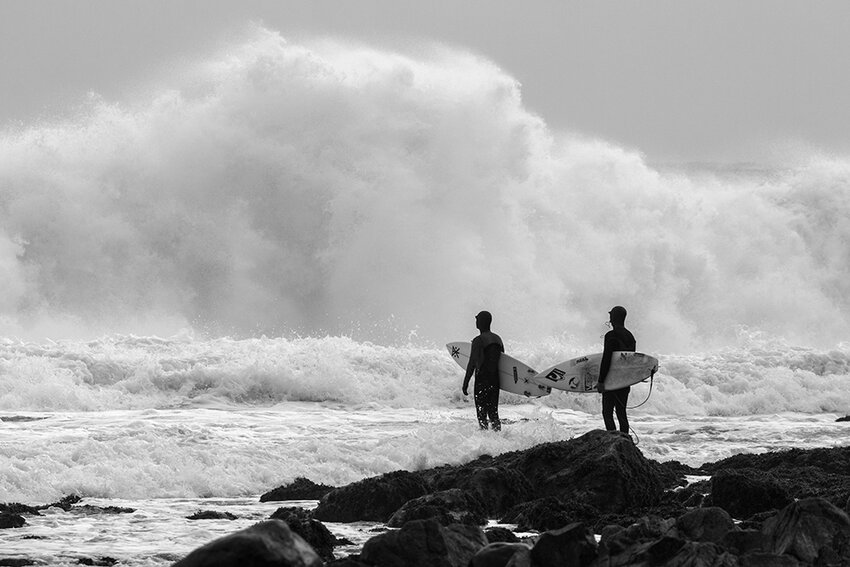 Raph Bruhwiler and Josh Mulcoy on one of the biggest days Paladino has ever seen at this spot.
Raph Bruhwiler and Josh Mulcoy on one of the biggest days Paladino has ever seen at this spot.What makes Tofino such a special surf spot?
The consistency — you can surf for 365 days a year here. The waves might not be great, but there's always a wave. I think it's a pretty special place for that, and I think that's something that a lot of other cold water destinations lack.
In Nova Scotia, for example, the waves are far superior. But it goes completely dead flat in the summer and there's lots of flat spells in the winter. Whereas here it might not be the best day of the year, but you can still get in the water and catch a few waves.
How do you keep it interesting?
Well, I don't really know, but my sister said it pretty beautifully. We were talking about my photography and she said, "It's been interesting watching you go from documenting action sports to an artistic expression of said sport and lifestyle." Which I didn't really think I was doing, but I think that nails it on the head. It's become more about expressing myself through these sports and, like I said earlier, document them creatively.
Do you have a favorite photo from your career?
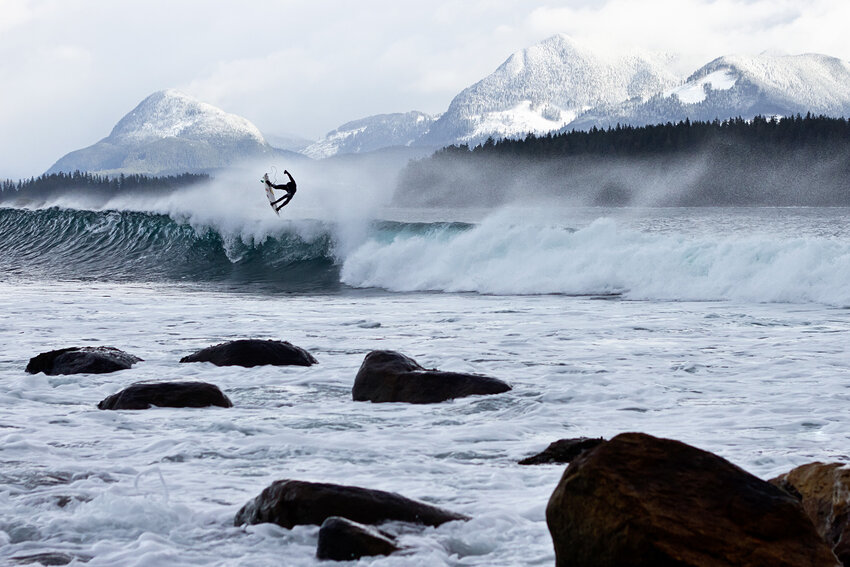 Paladino meets Pete Devries, nine-time consecutive Canadian men’s champion. “It started the beginning of my journey as a surf photographer.”[/caption]
Paladino meets Pete Devries, nine-time consecutive Canadian men’s champion. “It started the beginning of my journey as a surf photographer.”[/caption]I hate that question. Because that means my career is like over. If you have a favorite photo, I think that should be like the end of your career. That’s it, done.
Do you have a favorite from “Cold Comfort?” That’s what I like to hear: What other people’s favorites are.
The black and white inverted shot of Michael Darling. And the one of Pete Devries standing tall, making it look easy. (It’s on the cover.)
What do you do in the off-season?
I’ve gotten into mountain biking recently, which I like taking a day off for. And it’s nice to have something where I don’t necessarily feel pressure to take photos. Sometimes I see something and think, “It’d be nice to have my camera right now.” But it’s nice to be able to do something outdoors without it. x
Marcus Paladino is a surf and outdoor photographer living in Tofino, B.C. He strives to have simple descriptions like ‘surf shot’ or ‘nature photo’ fall short. That’s when his work becomes art. Marcuspaladino.com